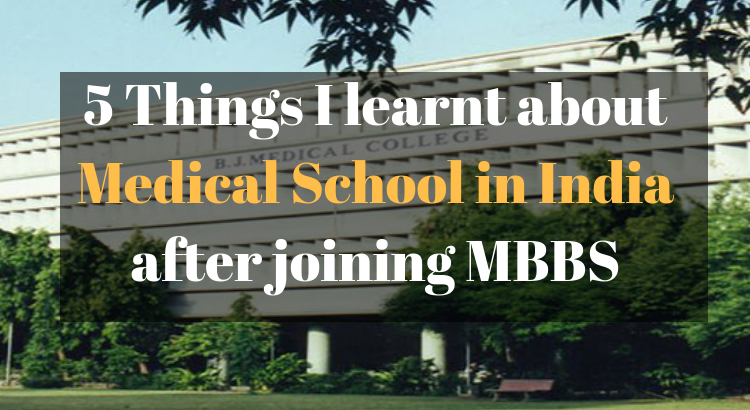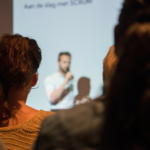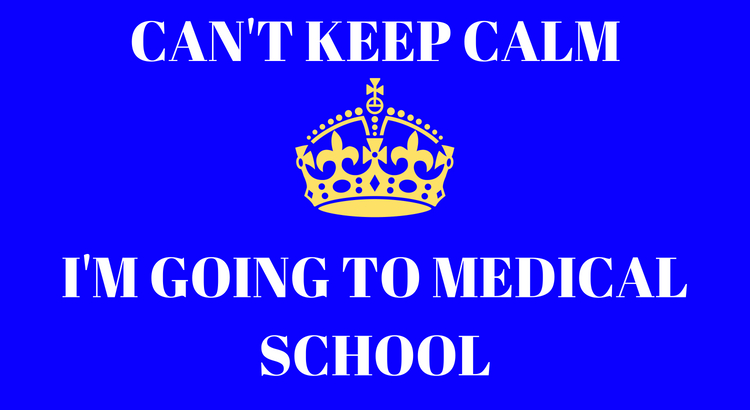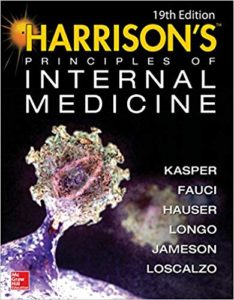First Year – Embrace the frustration
I remember the day I knew I was getting admission into a medical college. I was overjoyed and overwhelmed. I couldn’t wait for the professional course to start and finally wear that apron.It was my dream since I had first thought of being a doctor.
First of all, congratulations, you made it! Cracking JEE/PMT was tough, but you somehow made it, and now you are here, so welcome to the medical college.
Being done with the intro lets come to why I am writing this topic. A few years back, I was in the same spot as you, but it took me some time to figure out things about the college all by myself, and being a science guy, it was slightly tricky for me to adjust at first to the fast pace college lectures.
If I have to be brutally honest, then I have bad news for you. You will have to work twice/thrice as hard that of your JEE preparation here to pass. There will be sleepless nights, and 1st semester will be challenging, but with the help of this little guide, I guess you will do just fine as I decided to hence in short, write how your 1st-year M.B., B.S. will be, how you will have to study and which books you can use.
Mainly in a medical college, newbies are afraid of being ragged. However, don’t worry, most colleges have powerful anti-ragging committees, and you should have proper protection against any menacing behavior. You won’t be ragged! At least physically.
However, if your seniors try to talk to you, ask your name, rank, or hometown, don’t be shy and run away. To get people talking, most seniors try to devise funny games and weird tasks. Be a sport and play along. These moments will strengthen your bond with them, and believe me; you are going to require their help, A LOT! They can advise you on which books to use, which lectures to attend, and even what clothes to wear on the day of vivas! Being a chicken will only keep you from these words of the gurus!
You are coming to academic affairs. You won’t deal with any patients this year, apart from those asking you for directions for some room.
As you may already know, you have three non-clinical subjects for your first year:
1. Anatomy
2. Physiology
3. Biochemistry
Anatomy is the study of the masterpiece. The intricate structure of the human body. In physiology, you will learn how this creation works fascinating wonders. The body processes. While Biochemistry will tell you how the tiny non-living magician molecules interact to sustain this miracle of life. (you know the Glycolysis pathway and Krebs’ cycle, right?)
Now coming to the examination system. You will have two main semester exam one, usually in January, and another around the end of May. After passing these two exams, you will have to sit for the First Professional MBBS exam conducted by the university, which happens around the end of July a month after your second-semester exam. Apart from these big exams, you will have part completions and items throughout the year as self-assessment tests.
M.B.,B.S. is, in fact, a course of 4.5 + 1 (compulsory internship) years.
1st year – is of practically only 8 – 9 months
2nd year – is of 1 year
3rd year – is of 2 years (Don’t ask me why they call it a year then)
Now coming to the books, you will you throughout this course, and coming to books, I should mention our college’s “Cheap Store,” which has all the books and that too at a discounted price. Else you can always rely on Amazon or Flipkart to get you the best deal.
Anatomy
Anatomy is the largest and most extensive of the three, requiring intense hard work and sincere efforts. The first fear that every medical student faces is the fear of new long words; for that, you will need a dictionary, and Dorland is the best medical dictionary.
Coming to the books, and here I want to give you guys a little tip. Use one foreign author review book first to have a good grasp of the subject. Then use the Indian author book to have a good grasp of the questions asked in the exam. This will make you have a solid understanding of the subject as well as you will be able to do good in the exams. So I am going to divide the list of books under two headings for all the three subjects:
Foreign Review Authors for Anatomy:
*1. Gray’s Anatomy Student Edition – My personal favorite as this serves both the function of an Atlas(a book with many pictures) and concisely has all the essential clinically relevant points written down.
2. Clinical Anatomy by Systems (Snell) – Some people highly suggest this book.
Indian Authors for Anatomy:
1. Human Anatomy (By AKD) – commonly used by West Bengal students
*2. B.D. Chaurasia’s Human Anatomy
Well, the list goes on and on, but what I can suggest is that whatever book(series) you use for studying anatomy, stick to that don’t try to study SUPEX from both AKD as well as BDC that will just ruin things for you. Instead, what you can do is do SUPEX first from BDC and then just read the clinical correlates and X-rays from some other book, but don’t try to read the whole chapter from both!
3. High Yield Gross Anatomy – Another excellent book for revision before the exams!
Another small tip is that don’t waste much time taking pictures of corpses instead practice regularly with your friends the structures shown the previous day it is more useful than H.D. videos of the teacher showing structures.
*are the must-have books!
Physiology
Well, you will love this subject as it is the only subject that makes proper sense and giving it a little time each day will bring you fruitful results, but you will need concepts to ace physiology and to do that your primary selection of book should be perfect!
Foreign Review Authors for Physiology:
1. Ganong’s Review of Medical Physiology
*2. Guyton’s Textbook of Medical Physiology
*3. BRS Physiology (by Linda S Costanzo)
It would help if you bought Guyton which is better than Ganong, but my personal favorite is BRS Physiology where they provide all the facts from each chapter in a nutshell, and it’s concise, so after buying Guyton or Ganong but BRS
Indian Authors for Physiology:
1. Principles of Physiology (By Debasish Pramanik) – commonly used by West Bengal students
*2. Essentials of Medical Physiology – Sembulingam
Well all of you would need “D.P.” before the exam to prepare for semesters but if you have bought something else then that will work too, but still I suggest you get a “D.P.” and do all the topics from it.
*are the must-have books!
Biochemistry
The subject which you will ignore for most of the year is Biochemistry and since you will only study this before the exam so your choice of books should be right to aid you before the exam.
Foreign Review Authors for Biochemistry:
*1. Lippincott Illustrated Reviews: Biochemistry – This is the religious textbook of biochemistry, you study this you understand biochemistry, no other book is better than this!
2. Harper’s Illustrated Biochemistry – Although you will hear many recommending this book, it’s pretty much useless at our level. It’s a book for post-graduate biochem students. Don’t buy it.
Indian Authors for Biochemistry:
1. Textbook of Biochemistry for Medical Students (by Vasudevan)
*2. Biochemistry (by Satyanarayana)
Everyone recommends you buy Vasudevan but belive me, Satyanarayana nails it by being to the point and precise, and it’s just invaluable to those who won’t touch this subject throughout the year but will only sit with biochem when it comes to the exam!
Second Year – Taste of Medicine
While surviving the first year is a herculean task. Second-year, especially 3rd semester, should be used to its maximum potential.
In the video, I discuss in detail the resources to use, and the ones to avoid.
While you think of relaxing after your first year is over. This is the ideal time to put the pedal to the metal. While many of your peers will be go clubbing on almost every weekend, unless you use your time wisely this year, you won’t be able to shine during your post-graduate examinations.
Free video resource which I suggest you use – https://onlinemeded.org/spa/basic-sciences
Books which I recommend:
Pathology: Big Robbins (Reference); Goljan (Reading); Pathoma (Revision/Reading)
Pharmacology: Katzung (Reference); Lippincott (Reading); Kaplan Lecture Notes (any edition) (Revision/Reading)
Microbiology: Clinical microbiology made ridiculously simple (best resource)
Immunology: Levinson
Link to my 2nd MBBS Resource (specific to colleges in West Bengal/ you may find something useful here) – https://mega.nz/folder/W8YGHSoC#SAkWW3ZN0KEXnbvw9C9o_w/folder/ftg3jA6S
Final Year (MBBS Part 1 and 2) – Why is my hair falling out?
The final year is considered one of the cruelest years in MBBS. I clubbed part 1 and part 2 during my prep and would ask you to do the same. While these two are treated as sperate years, unless and until you start reading about medicine and the other final year subjects from Day 1 of Part 1, you won’t be able to keep up with the college or your over-achieving peers. Below listed are the resources which I had used to ace my final year examinations.
Free Video Resources:
OnlinemedED – https://onlinemeded.org
Paul Bolin’s Channel – https://www.youtube.com/channel/UCyaG5WliXdoVSC-yh5iDk8Q
Books which I recommend:
ENT: Dhingra
EYE: Khurana, Sure Success Ophthalmology (practical)
Community Medicine: Park (reference), Maiti (exam prep)
FMT: Ask your seniors!
Medicine: Harissons (Reference); Step up to Medicine (Reading); Matthews (Revision/Reading)
Surgery: Pestana’s surgery notes (best resource), Bailey and Love (reference), SRB (exam prep)
Gynae and Obs: DC Dutta (ref), Aftab sir’s book (reading), Exam prep manual (Bhojani – reading)
Pediatrics: Ghai (reference + reading)
Link to my Final MBBS Resource (may be specific to colleges in West Bengal) –
https://mega.nz/folder/W8YGHSoC#SAkWW3ZN0KEXnbvw9C9o_w
Well, with this Gyan, I would like to conclude this post. I hope this helps you in some way, and also, feel free to contact me in the Youtube comment section/ Facebook messenger/ Instagram/ Twitter or comment here if you need help with anything.
About the author – Dr. Arjun Chatterjee
“ I want to thank Dr. Rohit Nathani for allowing me to write this article for his blog. I have made a few videos on my YouTube Channel going over the highlights from this post, which I will be attaching to the article. Hopefully, you’ll find this helpful.
I completed my MBBS and internship from Calcutta National Medical College. Having taken all steps and done my clinical electives, I plan to apply for residency in the United States of America (Match 2021). Right now, I am working as a Research Trainee in the Dept of GI at Mayo Clinic, my research interest being pancreatic cancer.”
Ask the author your questions using the comments section below.
Liked this post ? Share it with your friends on social media!
This blog is made by imgs for imgs, so help out your friends by sharing your USMLE experiences. You can fill out the form on the Contribute Page or email us at theindianmedicalstudent@gmail.com.






 Here’s where the bio statistics kicks in! Hate stats? Don’t worry. You can always outsource a bio statistician. However, we recommend doing it on your own because you gain experience. Learn the basic tests and formula of bio stats. These can be easily found on Microsoft Excel. Use software for your bio stats. Do not go stone age with a paper and calculator! You won’t finish it in this lifetime.
Here’s where the bio statistics kicks in! Hate stats? Don’t worry. You can always outsource a bio statistician. However, we recommend doing it on your own because you gain experience. Learn the basic tests and formula of bio stats. These can be easily found on Microsoft Excel. Use software for your bio stats. Do not go stone age with a paper and calculator! You won’t finish it in this lifetime. There are many conferences both national and international. Google conferences and you will find a list. Look for the ones that accept articles from medical students. Presenting your research before sending it to a journal is always a good idea because you are presenting it to your colleagues. Their criticism and questions only help your research better and more complete.
There are many conferences both national and international. Google conferences and you will find a list. Look for the ones that accept articles from medical students. Presenting your research before sending it to a journal is always a good idea because you are presenting it to your colleagues. Their criticism and questions only help your research better and more complete.
 The number 1 reason why most medical students think about doing research is to have something on their CV. Be it for your residency application abroad or a job interview, (published) research makes your CV stand out from the rest of the herd. Doing research shows that you are passionate about this subject and are willing to go that extra step even when it is not expected out of you.
The number 1 reason why most medical students think about doing research is to have something on their CV. Be it for your residency application abroad or a job interview, (published) research makes your CV stand out from the rest of the herd. Doing research shows that you are passionate about this subject and are willing to go that extra step even when it is not expected out of you. There are several government and private scholarship opportunities available for medical students who conduct research. The government encourages research because when you do quality work, you become your country’s pride.
There are several government and private scholarship opportunities available for medical students who conduct research. The government encourages research because when you do quality work, you become your country’s pride.
